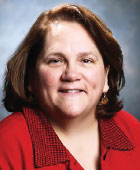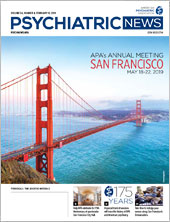I am of the generation that bought comic books during childhood. The 25-cent cost happened to match my allowance, which I earned by working alongside my sibs in our huge garden by the drive-in (my dad was a movie theatre manager). We tended crops of corn, green beans, and tomatoes that we “put up” (alongside the fish we caught and froze) to sustain us through lean winter months. Yes, I am that old, and we were that poor. Comic books were swapped twixt sibs, and I held the distinction for knowing every detail of each character’s origin story.
My favorite comic book character was Dr. Strange, and perhaps that explains why I chose to become a psychiatrist—psychiatrists get paid to listen to people’s stories, and each story is different from the next and has its own trajectory and ending depending on what impacted it along the way.
How will your life be impacted by attendance at APA’s 2019 Annual Meeting in San Francisco? How might APA be impacted by your attendance? Maybe by examining the origin story of the meeting’s theme, we can make some predictions. Have you ever wondered how APA presidents come up with their themes for the Annual Meeting and the IPS (APA’s fall mental health services conference)? I cannot speak to the process for other presidents, but the method used by Dr. Altha Stewart for our 2019 meeting was pure Altha.
Altha has been clear about her priorities for her year in office. They are meant to move APA along in its journey to better serve its membership: engage and support trainees and early career psychiatrists, expand APA collaboration on global mental health, and expand APA’s efforts in diversity and inclusion. As I scrambled to begin the planning process as chair of the Scientific Program Committee (SPC) for the meeting, I queried her about her choice of theme. In her typical fashion of mentoring and challenging and working in partnership (versus taking a hierarchical approach), she bounced the ball right back in my court and said something like, “I don’t mind sharing this creative process. I trust y’all to come with something great.”
I spent a day with my thesaurus looking for just the right six words (my own self-imposed limit). I knew we wanted something brief, intense, and pithy but also hopeful and inspiring—something broad enough to allow for a breadth of submissions that would attract authors and presenters alike, something that mirrored APA’s priorities, something that reflected Altha’s passions, something that would entice folks from across the country and across the world to join in a special learning community. I already knew that having the meeting in San Francisco was going to be part of the allure.
So my first attempt at a theme was “Revitalize Psychiatry: Engage, Include, Innovate, and Disrupt.” Instead of using present participles that muted the words’ effects by ending in “ing,” I used active verbs to make the theme a call to action. These are the words and why I chose them after some thoughtful considerations:
•
“Revitalize”: To reflect our understanding that perhaps APA wasn’t meeting all the needs of our constituencies and to embrace our responsibility to pursue the creation of a different trajectory, leading to a more meaningful and compelling future for our field.
•
“Psychiatry”: To encompass psychiatric and other behavioral health clinicians, educators, and researchers in the United States and abroad.
•
“Engage”: To identify with those feeling disaffected and reach out to psychiatrists, patients, trainees, and decision- and policymakers.
•
“Include”: To underscore the imperative need to enthusiastically embrace diversity, all stakeholders involved in mental health care, and what needs to be done to address disparities. The word is not meant to be redundant with “engage”; it is meant to grab us all, to make us mindful and responsible to actively increase access to mental health services, ensuring that patients and families quickly, efficiently, and effectively get the care they need.
•
“Innovate”: To be deliberately broad and inclusive of research, education, care, and governance (which widens the net for different topics in terms of submissions and audiences) and think of “new” ideas (including technology).
•
“Disrupt”: I admit I threw this word in for a symbolic representation of shaking things up, hopefully striking a chord with the younger crowd and inspiring us older folks to feel the excitement we first felt when we started out. I included the word hoping the meeting might broaden our approach to the future and unafraid to take chances to maximize different approaches to the field of psychiatry. When a millennial heard the theme, he said, “The order is all wrong!” I had put the word “Disrupt” at the end to be jarring and challenging; he recommended I put it first, saying, “It’s a word millennials gravitate to; they’re comfortable with it. To us, it’s exciting and positive and relatable and means action and change are forthcoming.” He was right, and Altha loved it!
Hence, we arrived at our theme for APA’s 2019 Annual Meeting: “Revitalize Psychiatry: Disrupt, Include, Engage, and Innovate.” Here’s hoping understanding our meeting theme’s origin story will resonate with our trainees and early career psychiatrists, our midcareer brothers and sisters, and us folks who struggle with Instagram accounts. Here’s hoping it will inspire our diverse membership across the country and the globe to come together in San Francisco for grand learning, exciting innovations and technology, and intimate networking and mentoring. Here’s hoping “Disrupt” translates into exhilarating developments and recommitment to our evolving field of psychiatry.
See you there! ■


